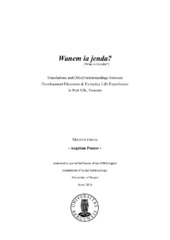| dc.description.abstract | Labelled as one of the Least Developed Countries, Vanuatu is a popular place for international Development agencies. The situation of women is particularly often targeted in the Development discourses and buzzwords like women's empowerment", Gender equality" and Gender Based Violence" are commonly used, e.g. in reports and awareness campaigns. The term Gender only recently has a translation in the national language Bislama: jenda, but the concept of Gender is not necessarily understandable because of that. Using Gender as a concept metaphor, this thesis examines, how concepts from the Development sphere are communicated to non-elite Ni-Vanuatu women and men. The processes of translation (literally, as well as figuratively) happens in a sphere between Development discourses and everyday life experiences of Ni-Vanuatu; a sphere I call the gap. In this power-loaded gap, a group of cultural translators" emerged, who are usually Ni-Vanuatu themselves, but have access to education and economical wealth - an emerging elite. Inspired by Sally Engle Merry's approach to analysing the space between transnational Human Rights and local activism, this thesis will combine theories of translation and (mis)understanding in order to spotlight some processes inside the gap. Especially Edda Weigand's linguistic model of misunderstandings appear helpful to uncover some ontological differences. By looking at the language and methods used in a national survey on women's lives, as well as an analysis of the rhetoric used in an awareness campaign against Violence Against Women, the thesis shows the premises, which these forms of communication are built on and places them into a wider frame of power/knowledge dynamics. The thesis juxtaposes the discourse analysis with two Ni-Vanuatu key concepts, the concept of angkel and the practice of braed praes, which have often been confused with eurocentric concepts of uncle and bride price. Based on this confusion, important ontological concepts of personhood and Gender have been misunderstood. Eventually, this thesis suggests to overcome the gap by creating spaces for dialogue and refers to the social theatre performance Aelen Gel as an example for an alternative way of coming to an understanding. | en_US |
